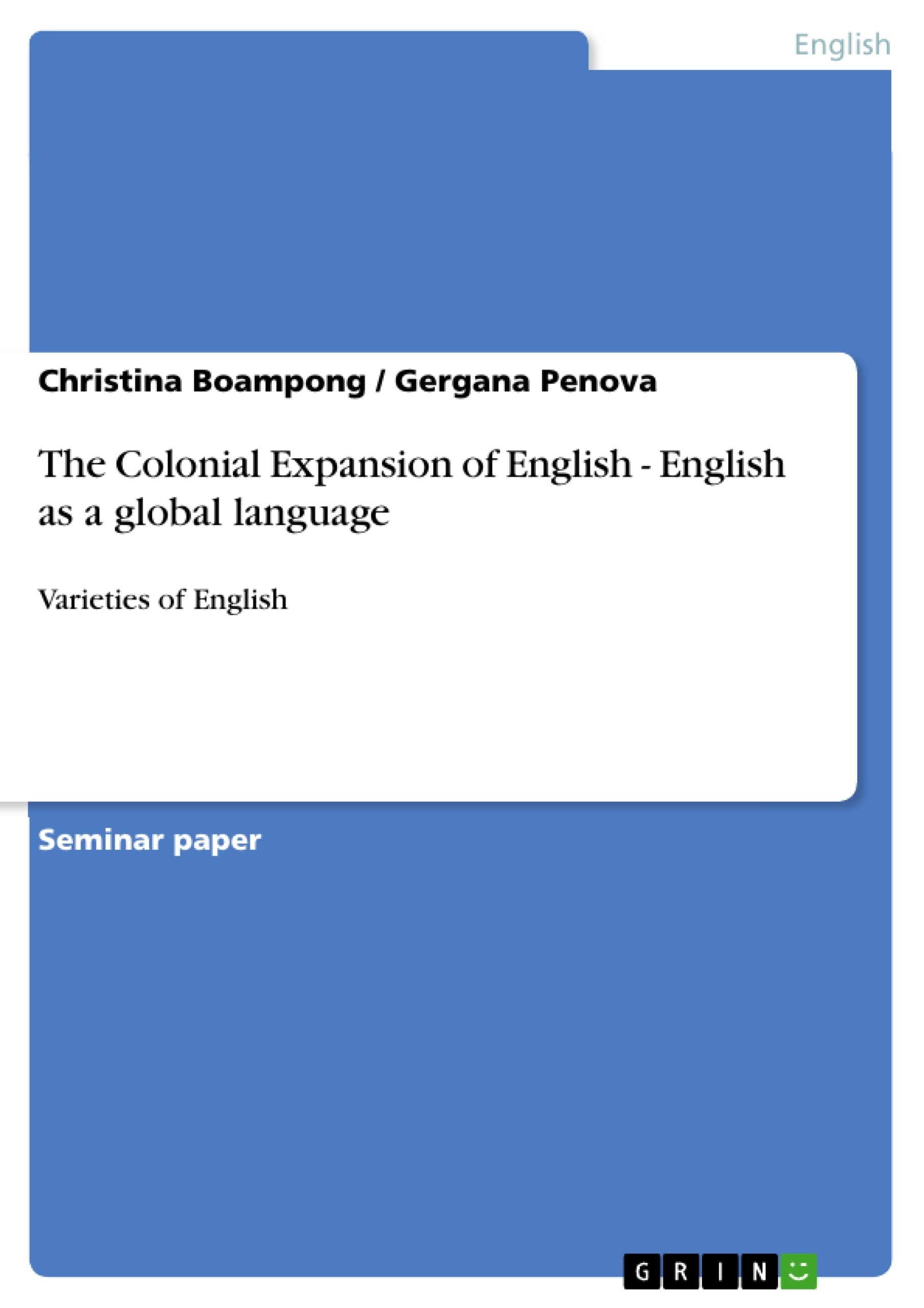English is the language of commerce and tourism, of international politics, of science, the official language of international and multinational companies and industries, the language of air traffic control, of international news agencies, of mass entertainment, of computers and of the Internet. It is assumed that about a quarter of the world`s population is already fluent or competent in English (that means around 1,5 billion people) and that there is a total of 75 territories where English has a special place in society.
These regions can be divided according to the status they give English: Either they have English as a native language, as a second or official language or as a foreign language. This classification is visualized by the so-called Three-circle-model: The inner circle compromises those countries where English is the primary language of communication and is learnt as a native language by the majority of the population. It includes the United States, the United Kingdom, Ireland, Canada, Australia and New Zealand. The outer or extended circle represents the countries where English plays an important role in a non-native setting. In many cases these are former British colonies where the English language is part of the countries leading institutions and of various other domains. This circle includes India, Malawi, Singapore and 50 other territories. The expanding circle involves those countries in which English is learnt as a lingua franca by many people. These countries neither have a history of colonization nor have they given English any administrative status. Such countries are Germany, Japan, Israel and a growing number of other states.
Fennel (2004) divides the global spreading of English that has lead to its status as a world language into four phases:
I. British colonialism from the seventeenth to the twentieth century
II. British leadership in the Industrial Revolution in the eighteenth and nineteenth centuries
III. American economic superiority and political leadership
IV. American technological domination
In what follows we will focus on the first phase: The colonial expansion of English, which also marks the beginning of the Modern English period. The main idea of this term paper is to introduce the most popular varieties of English around the world and to familiarize with the historical facts and development of these countries emphasizing on the specific linguistic characteristics.
Inhaltsverzeichnis (Table of Contents)
- Introduction
- American English (Christina Boampong)
- Canadian English (Gergana Penova)
- Black English (Christina Boampong)
- Australian English (Gergana Penova)
- New Zealand English (Christina Boampong)
- South African English (Gergana Penova)
- South Asian English (Christina Boampong)
- Conclusion
Zielsetzung und Themenschwerpunkte (Objectives and Key Themes)
This term paper aims to provide an overview of the most popular varieties of English around the world, focusing on their historical development and specific linguistic characteristics. The paper explores the impact of British colonialism on the expansion of English and the emergence of distinct regional varieties.
- The historical development of English as a world language, emphasizing British colonialism.
- The influence of regional and social factors on the formation of different English varieties.
- The specific linguistic features that characterize different varieties of English.
- The ongoing evolution and diversification of English in various regions of the world.
- The role of English as a lingua franca in a globalized world.
Zusammenfassung der Kapitel (Chapter Summaries)
- Introduction: This chapter discusses the global spread of English and its status as a world language. It highlights the different roles English plays in various societies and introduces the Three-circle-model for classifying the status of English in different regions.
- American English (Christina Boampong): This chapter traces the history of English colonization in North America, exploring the origins of various regional dialects in the United States. It discusses the influence of different European settlers on the development of American English and the ongoing evolution of its regional varieties.
- Canadian English (Gergana Penova): This chapter examines the historical development of Canadian English, focusing on the interplay between British and French influences. It highlights the unique linguistic features of Canadian English and its ongoing evolution within a bilingual context.
- Black English (Christina Boampong): This chapter explores the history and development of Black English in the United States, emphasizing its origins in the African diaspora and its distinct linguistic features. It discusses the socio-cultural factors that have shaped Black English and its ongoing evolution.
- Australian English (Gergana Penova): This chapter delves into the development of Australian English, tracing its roots to British colonization and the influence of indigenous languages. It discusses the distinctive features of Australian English and its evolution in a geographically isolated context.
- New Zealand English (Christina Boampong): This chapter explores the history and characteristics of New Zealand English, highlighting the interplay between British and Māori influences. It examines the unique features of New Zealand English and its ongoing evolution in a diverse linguistic landscape.
Schlüsselwörter (Keywords)
This paper focuses on the colonial expansion of English, exploring key topics such as language contact, dialect variation, pidgin and creole languages, sociolinguistics, and the historical development of different varieties of English. It also examines the role of English as a lingua franca and its ongoing evolution in a globalized world.
- Quote paper
- Christina Boampong (Author), Gergana Penova (Author), 2005, The Colonial Expansion of English - English as a global language, Munich, GRIN Verlag, https://www.grin.com/document/146498



